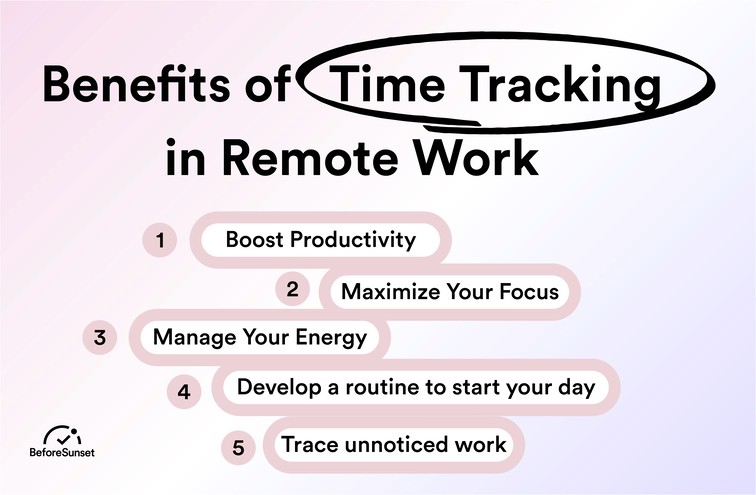Telecommuting comes with subtle challenges. Such as adaptation to the remote work and its effects. The good news is that you can overcome this process easily with life-saver productivity tools such as productivity software. When you noticed the obvious increase in your productivity, you'll know that it's because of the time tracking benefits.
The benefits of time tracking are more than you can imagine. Time tracking, not only enhances trust among employers and their remote employees but also ensures accurate billing and sound communication. Thus spurring companies into being more productive.
Remote Work is Here to Stay
Many of us are pleased with telecommuting as it means more flexibility in our daily lives, and less time spent traveling to work. Unsurprisingly, a recent World Economic Forum survey conducted among 12,500 employees in 29 countries revealed that 66% demand more flexible work hours. 30% consider changing jobs if forced to return to the office full time. As for employers, many of them delay office returns or opt for hybrid models owing to the rise of new Covid-19 variants. Now it is possible to even have a virtual office in the metaverse. Yes we are in the age of metaverse development.

"That's fine by me", most readers might be thinking at this point, however;
Are we well-equipped to address the challenges brought along by telecommuting?
Remote work requires a tight balancing act between flexibility and productivity. Understandably, employers and executives tend to grow suspicious as to whether employees are working efficiently. On the other hand, despite endless video calls, don't we all feel that communication within and among teams is compromised?
Most of all, billing the hours worked becomes yet another potential source of mistrust.
A Happy Team is not a Utopia
Employees also have some minor thoughts regarding remote work: "Are my efforts being seen and appreciated by my team leader?"
It is pretty essential in our way of work to appreciate our team's efforts. According to this article, employees recognized are 63% more likely to stay in their current job for 3 to 6 months. Another exciting piece of data is that 65% of employees haven't received recognition for their excellent work in the last year.
This set of information is valuable to evolve our way of work in our current situation. Employees who are working remotely need recognition.
Here comes the time tracking!
One of the biggest benefits of time tracking is to increase employee recognition through its transparent system. Employers can manage the working schedule by their teams' most efficient working time. They may create time frames for their team to make them feel understood, recognized, trusted. And most of all happy; one of the most important benefits of employee time tracking.

Today, employee happiness is one of the core points among workers. Employees value honesty, transparency, and teams that accept diversity—because of that, being fair in every step of your project management holds non-accountable value during work processes. To act fair and reflect this idea, employees should see the resource allocation you set up and even give feedback on improvements. We can say it’s more effective than just a “well done” remark.
What is Time Tracking?
Time tracking is the process of capturing and recording time spent on a project or task. It includes all activities involved in accomplishing a goal, such as meetings with clients, emails sent, and phone calls.
It is a method of organizing our time and understanding how we are spending it since time means money!
You can measure your own and your team's productivity by analyzing your work efficiency through time tracking benefits.
The Importance of Time Management
How much time do you spend browsing the web, looking through your inbox, and trying to find one document in a pile of folders?
Even in the ideal work environment, you can see some people who have no time to achieve what they want. However, some others who are pretty relaxed and have plenty of time in their hands. So what's the difference between these people?
The answer is simple: Time management skills.
According to research on Development Academy, only 18% of people have a proper time management system, and only 20% of people carry out a monthly time audit.
Usually, people have been addressing their work on a "whatever comes up first" basis. This definitely won't be helpful on productivity.
The key to managing our time better, being more productive, and focusing on what we love depends on our time management skills. One fundamental importance of time management is that we can save time along the way and achieve our development goals way earlier than they could have been.
Moreover, understanding the difference between the urgent and essential, plays a significant role in time management. When prioritizing work, we might mix these two up and miss what exactly needs to be done. So, analyze that specific task and decide whether it should be prioritized or not. Then, plan your schedule according to that decision.
Procrastinating
One crucial subject about this matter is "procrastinating".
Almost everyone procrastinates from time to time, whether the workload is enormous and looks pretty tiring at first or we have to ease our mind to start working. The main primary driver of not procrastinating is having an awareness of the task at hand. With enough understanding of both ourselves and the mission, we can avoid procrastinating easily. One key aspect of this awareness is, as you may have guessed it, time management.
Procrastination wastes our time by focusing on things that are not urgent or important. We can easily avoid this by planning with proper time management skills and creating an ideal workflow.
Here are some other vital points that why time management has the utmost importance in our lives:
Avoid stress by planning correctly.
Managing our time reduces our stress levels and has a positive outcome on our confidence. We know our schedule. Therefore, we have general control of what we need to do and when. Taking control of our time reduces our anxiety as well.
Time management enables us to foresee possible problems beforehand. Efficient time management allows us to plan better ahead and not have nasty surprises during any process
Achieve a better work-life balance.
This point is self-explanatory. Just managing our time lets us plan our daily lives in a broader perspective. Besides, planning our work hours negates the burnout effect, so we can generally have better after-work hours.
As we understand the value of time, we have a clear direction towards our personal goals. By time management, we know what we need to work on and how much time we do have, and this lets us plan both our work and daily lives in a better manner.
Higher focus
Effective time management increases our productivity. When people know what they need to do and the necessary time window, their productivity increases. Being more productive allows us to save a more considerable amount of time and makes us feel elevated.
Time management means working smarter. When we manage our time, we develop not just higher focus but other positive habits as well.
To Manage It, First Track it!
Time tracking is a common practice that many project managers utilize to better gain control over their team. It allows them to determine who on their team has completed what. This will help make sure that the right people are getting credit for their work.
Moreover, you can measure the time it takes to complete projects and estimate future projects.

Benefits of Time Tracking
The benefits of time tracking are numerous, but the most important ones are listed for you below.
Here is the detailed list of Time Tracking Benefits:
1-Boost productivity:
Productivity is heavily tied to the results of our work. Time tracking software materializes our ineffective work and lets us prioritize our tasks.
The ability to monitor a team's work hours helps businesses to identify who is motivated, distracted, or stuck at a certain stage.
Moreover, it allows leaders to intervene at the right moment to offer proactive support such as training, shifting them to another team, or redistributing the workload within a team.
Here are three-team productivity strategies you can apply easily with our time tracking software and achieve the results you desire swiftly:
Maximize your focus
Trying to decide what's important might be quite a hassle. With time tracking benefits, you can now see which task requires more attention and how long it takes to be completed. You can prioritize your workflow, maximize your focus on whichever task you see fit.

Manage your energy
We are more or less productive during different times, and it is valid for every team member. What type of energy do we have in the morning/evening? When do we become better at doing specific tasks? Seeing our way of work in a time tracker like BeforeSunset allows us to make better decisions on how we manage our own and our team's energy.

Develop a routine to start your day
How do you start your day: a coffee, relaxing music, or a short walk?
Everyone has different motivation factors while working. Some people prefer chatting with their co-workers, some of them might need to listen to an episode of their favorite podcasts to clear their minds. Everyone is unique, and everyone has a different period to charge and start their day off. One of the biggest time tracking benefits is to see our team's work habits and plan according to their needs in a perspective and create a more productive day ahead for everyone!

BeforeSunset allows you to create individual projects and track the time with additional notes. You can designate users as project managers or account managers, therefore providing insights to your team to increase productivity.
2- Transparency into the work process:
Time tracking software is used to measure the time employees spend working. Time tracking apps let managers see if workers are spending too much time on one task and set boundaries for them. If an employee spends a lot of his/her hours ineffectively, it's not uncommon for him or her to exaggerate their hours.
Time registrations are used to make businesses more transparent. It allows you to stay on top of the working process and understand how long does it take to finish a job.
Whether you're a manager or specialist, you can have a 360° point of view on your work and have a chance to plan/schedule your tasks through the time tracking benefits. The insights you've gained from the tool are priceless.
3- Enriched trust and communication:
Time tracking enriches the trust within a company, since employees begin to deliver on tasks on a much more regular basis. Moreover, employers can observe employee commitment firsthand.
Time tracking facilitates communication since it shows workers and superiors who are active at which moment, making it much easier to schedule meetings. You will find this to be a game-changer, particularly when team members are in different cities or time zones. Maybe, more importantly, a time tracking tool doubles as a project management software.

4- Increased accountability in employees:
Employees can use time tracking tools to see what everyone else is doing while being able to optimize productivity where needed. Eventually, time tracking tools provide a bigger picture for employees.
Benefits of time tracking are effective on employees because it provides insights about their work. The need to register time makes employees more focused on tasks with a clock ticking. Time tracking also helps employees reflect and adapt to meet the needs of the organization.
5- Performance Management:
You can review employee performance and check time spent on each task, and make sure that all projects are on track since generating daily, weekly, or monthly progress reports is a breeze. You can analyze your teams' progress and work efficiency.
On the flip side, this provides valuable feedback for employees; as they get a better grasp of how productive they are during the day.
6- Accurate billing process:
Time tracking tools record everything you do while you are working.
All the hours, tasks and projects you entered into the tool, are being recorded and create accurate reports for your managers and clients. You don't need to remember which task you've mostly worked on and what will your rate be. With this automation, you can easily show your proven work and create invoices according to that data flawlessly.
The bottom line is; with the time tracking benefits your clients can see where their money has been spent, and you can see where all your efforts are gone.
7- Trace unnoticed work:
One of the important benefits of time tracking apps is that you can identify the tasks as billable or non-billable. This can not only ensure an accurate billing process for your clients, but also helps you to sidestep potential pitfalls that could lead to mistrust between team members.
All the meetings (both internal and external), mailings and business travels may not be noticed unless your team uses a time tracking tool.
As a result, time tracking tools are here to improve all your business processes both internal and external. By giving you sufficient insights; it's easier to determine the next step and identify the strategy to manage your business.
8- Manage your budget:
Time tracking software provides you to assess profitability across all your projects.
With the help of the detailed reports through a time tracking tool, you can carry out an elaborate analysis of your budget attainment and budget overrun by keeping track of the profit you obtain (or loss you incur) for each client and project.
Time and project entries help you to calculate the costs of that specific project and by this way, you can find out which projects are actually profitable or which are harmful that they cause serious losses for your business. So you can determine which client or project to focus on or drop it for good maybe.
How to Introduce Time Tracking Benefits to Your Team?
Here are some dos and don'ts of time tracking you need to know:
1. Initiation:
Don't startle your employees by implementing a new system all of a sudden.
Whether your decision to use time tracking was driven by the switch to a work-from-home arrangement or not, don't break the news to your team like a brick. Any modification you make must go through a specified set of stages to be accepted.
Do:Lead a Time Tracking 101 workshop with your staff.
Instead of implementing time tracking all of a sudden, give them plenty of notice and explain the time tracking benefits smoothly.
Then, ahead of time, get them up to speed on the program and educate them on everything they need to know about the time tracking system you're going to implement. Because of the effort you put into this preparation, your staff will be more productive and appreciate the time tracking system.
When completing a time tracking 101 with your team, make sure you cover the following topics:
- Which time tracking tool that you will use and its features.
- What will you do with the time tracking data you've collected.
- Advantages of time tracking on team productivity.
- Explanation of; this is not a performance management evaluation that'll affect their motivation badly.
2. Employee Management
Using time tracking to micromanage is not a good idea.
Managers of recently migrated remote teams might easily fall into the trap of micromanagement and utilize time tracking to do so. Managers can take advantage of time tracking software's features to keep track of every detail of how employees spend their work hours.
Actually, the nature of time tracking stands against micromanagement. In order not to micromanage your team, use time tracking benefits to oversee the work by analyzing the time and task entries of your team. And at the end of the process, you can give feedback to your team according to the data.
Do: Keep track of your time to encourage accountability.
To combat micromanagement, you must first comprehend why people want to micromanage. The fear of idle time that employees may encounter is the most common reason. However, employees may become resentful and resistant as a result of this.
Instead of instilling fear in your staff by utilizing time tracking, empower them to establish a sense of accountability. Allow them to keep track of their work and manage it.
Of course, you'll still use the data acquired from time monitoring to make informed and sensible decisions about your business and performance management. The ultimate purpose, though, is to use time tracking to keep your team members aware of their performance and productivity at all times, along with enhancing your overall business goals.
Structure for Timekeeping
One of the key objectives of time tracking is to provide reports that can be used to assist your team in meeting both productivity and business objectives. This won't be achievable if your team members don't log their time in the same way. While you want to make time tracking as simple as possible for your staff, you also don't want it to be unstructured.
One of the most typical difficulties of time tracking, for example, is the lack of naming conventions, which is also a common problem in project management. You won't be able to tell if resources are being assigned correctly to tasks and projects unless naming protocols are consistent. It can also have an impact on how you bill for billable hours.
Do: Provide basic and clear instructions.
If you don't use clear and easy-to-follow standards, even the most sophisticated time tracker will fail. Here are a few questions that your remote time tracking documentation should be able to answer:
-What tasks/projects should be tracked and which should not?
-What are the best ways to categorize jobs and projects?
An important time-tracking best practice that should not be overlooked is having clear and plain guidelines. Make sure you have defined protocols in place for tracking remote team time, so it goes as smoothly as possible.
How to track time?
Software such as BeforeSunset offers hassle-free and effective means of addressing all these challenges.
Such online time trackers allow employees to log their hours by simply selecting a project and a task falling under that project. They can begin time tracking with a click, or enter the duration worked directly.
After the time entry, both users and managers can see the daily and weekly workload, and get actionable insights for future projects such as:
- Identifying the capacities of the team and assigning tasks accordingly.
- Analyzing the team progress and work efficiency.
- Managing the budget by calculating the costs of the team efforts.
- Keep track of the profit obtained, or loss incurred for each client and project.
Every diverse team requires a management tool, especially if the workload is challenging to track manually. Try BeforeSunset now to see how user-friendly this special time tracking software is for your team and even for your unique projects! We would love to hear your own opinion on how we helped you achieve your goals. Don't hesitate to share your feedback with us!

